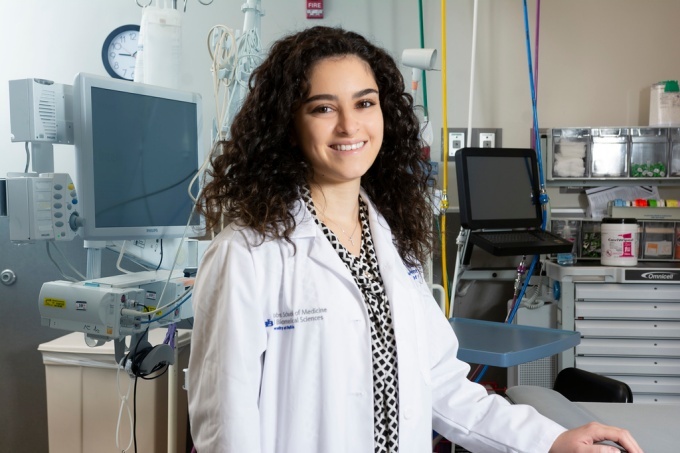PGY-4

Our program is known for its superior curriculum and clinical opportunities, but our greatest strength is our residents. With her urologic expertise and commitment to humanistic care, Kiana Saade, MD, helps patients feel at ease.
Current residents say our fourth-year curriculum helps them master increasingly sophisticated and complex procedures.
During your fourth year of training, we’ll increase your responsibilities and independence in all areas of patient management. You’ll find you have the ability to execute technical procedures with increasing dexterity.
At this point in your training, we trust you’ll have the skills to competently:
- obtain complete and accurate patient histories — and perform thorough and appropriate physical exams — of emergency and planned admissions
- appropriately use interviewing skills to facilitate patient responses
- evaluate trauma patients after they have been seen by second-year residents
- generate an appropriate differential diagnosis for emergency and trauma patients
- review findings and proposed treatment plans with our supervising attending faculty
- discuss appropriateness of inpatient or outpatient settings, considering the most effective and cost-effective setting
- manage patients from initial visit to follow-up care
You’ll be ready to prepare plans for patient follow-up that may include discharge planners, social workers, visiting nurses and home health care aids. Further, you’ll recognize and address ethical dilemmas and conflicts of interest.
Surgical Experience
By the end of your fourth year in our program, you should feel confident in areas including:
- recognizing and managing pre-operative, intraoperative and post-operative care of the patients with complex urologic operations
- performing open endoscopic, laparoscopic and robotic procedures with the guidance of our faculty members
- serving as an effective first assistant in major urologic operative procedures
- performing minimally invasive surgery including laparoscopy, ureteroscopy and endoscopy
Robotic Surgery
During your fourth year, we’ll help you master our minimally invasive, robotic-surgery technology.
You will undertake advanced robotic simulator training and spend the majority of your robotic surgery training at the surgeon console — the area where you can control the robotic instruments.
Rotations
| Location | Duration |
|---|---|
| Oishei Children’s Hospital | 4 months |
| Erie County Medical Center | 4 months |
| Millard Fillmore Suburban Hospital | 4 months |
Didactics
Some residency programs are heavy on didactics and lack hands-on practice. Others are deficient in didactics but offer an overabundance of clinical experience. We feel that a blend of both is best.
To help you continue to sharpen your presentation skills, we’ll ask you to present at each conference (except the tumor board and surgical skills conferences) at least once throughout the academic year.
Teaching Experience
As a fourth-year resident, you have opportunities to explain clinical reasoning and decision making to junior-level residents. You’ll be responsible for reviewing findings of the second-year residents and discussing diagnosis and proposed treatment plans with them.
You’ll also play an important instructional role in the clinical education of medical students. When you help teach medical students during their rotations at Erie County Medical Center, Millard Fillmore Suburban Hospital and Oishei Children’s Hospital, you’ll improve your ability to:
- provide feedback to students
- explain procedures
- ask students to demonstrate their knowledge
- facilitate active learning
- help students stay motivated
As an added benefit, teaching medical students also reinforces your own knowledge of the pathophysiology of urologic diseases, clinical management of patients in both inpatient and outpatient settings, and the surgical management of urologic diseases.